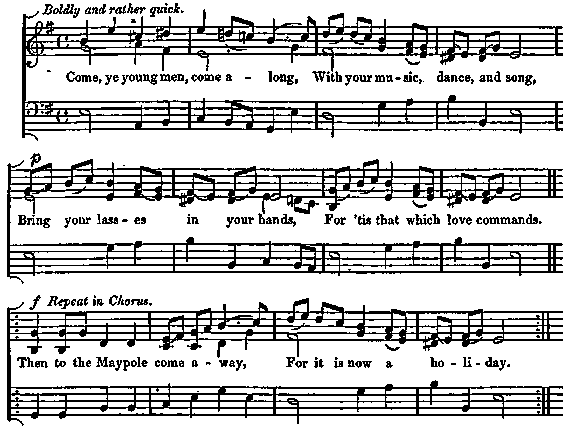Popular Music Of The Olden Time Vol 1
Ancient Songs, Ballads, & Dance Tunes, Sheet Music & Lyrics - online book
| Share page | Visit Us On FB |
|
126 ENGLISH SONG AND BALLAD MUSIC. |
|||
|
|
|||
 |
|||
|
|
|||
|
It is the choice time of the year, For the violets now appear; Now the rose receives its hirth, And pretty primrose decks the earth.
Then to the May-pole come away,
For it is now a holiday.
Here each hatchelor may chuse One that will not faith ahuse; Nor repay with coy disdain Love that should he loved again.
Then to the May-pole come away,
For it is now a holiday. |
And when you well reckoned have What kisses you your sweethearts gave, Take them all again, and more, It will never make them poor. , Then to the May-pole come away, For it is now a holiday.
When you thus have spent the time
Till the day he past its prime,
To your beds repair at night,
And dream there of your day's delight.
Then to the May-pole come away,
For it is now a holiday. |
||
|
THE SHEPHERD'S DAUGHTER.
This is in every edition of The Dancing Master, except the first, either under the name of The Shepherd's Daughter, or Parson and Dorothy. It is also under the latter title in several of the ballad operas. Percy says the ballad of The Knight and Shepherd's Daughter, " was popular in the time of Queen Elizabeth, being usually printed with her picture before it, as Hearne informs us in his preface to Qui. Neubrig. Mist. Oxon., vol. i., 70.
Four lines are quoted in Fletcher's comedy The Pilgrim, act iv., sc. 2: "He called down his merry men all," &c.; and in The Knight of the Burning Pestle: " He set her on a milk-white steed," &c. |
|||
|
1 In William Ballet's Lute Book, the third note of the melody is E; in the 2nd edition of The Dancing Matter, B, |
|||